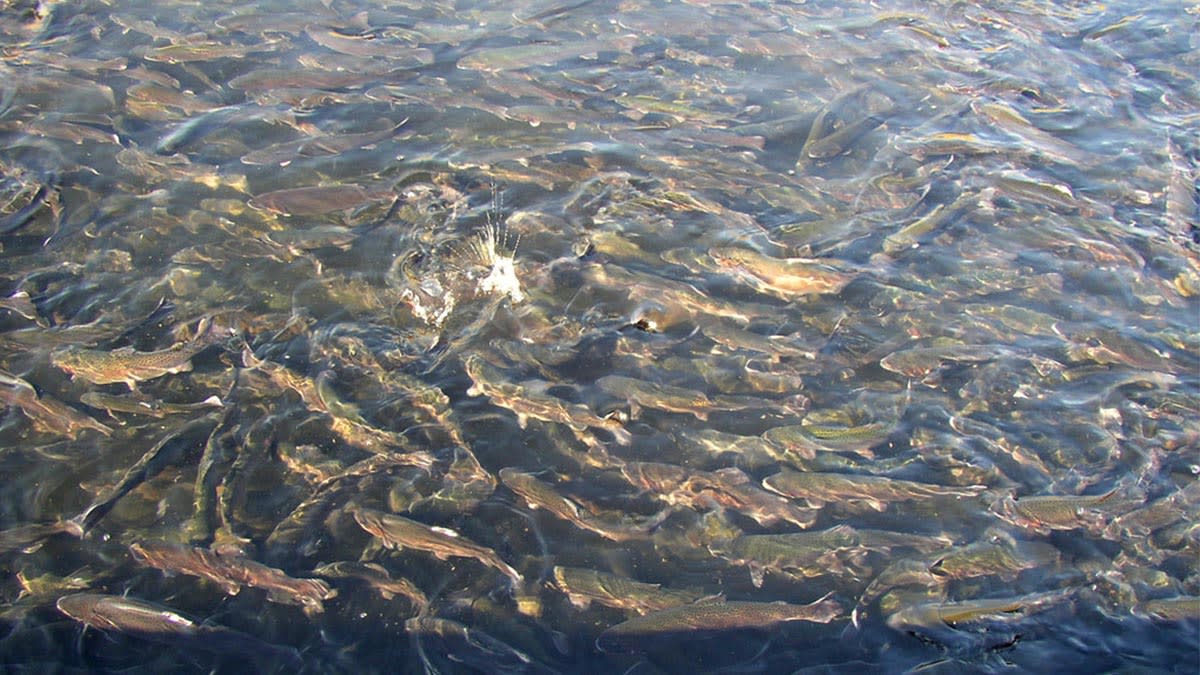Washington State Advances New Aquaculture Despite Recent Escapes

Remember a couple years ago when a quarter million Atlantic salmon broke free from net pens into Washington’s Puget Sound? The estimated 263,000 non-native farmed fish escaped from a dilapidated Cooke Aquaculture facility on August 19, 2017, near Cypress Island after the pens collapsed under the weight of millions of pounds of unmitigated mussels, barnacles, and fish waste.
Two-hundred thousand Atlantic salmon were never recovered, even after intensive purse seining and other capture efforts. Anglers even caught blunt-nosed farmed fish dozens of miles up the famed Skagit River while fishing for native steelhead and Chinook. It is not known if any Atlantic salmon successfully spawned, with each other or with wild Pacific salmonids.
The event sparked a nationwide uproar and led to the state legislature passing a law in March, 2018, to phase out existing and ban new leases for non-native net pens—the operative phrase being “non-native.”
This week, less than two years after that bill passed, the Washington Department of Fish and Wildlife approved a new permit for Cooke Aquaculture to farm rainbow trout—which are native to the area—in the same type of ocean net pens. The fish will be all sterile, triploid female trout, allegedly preventing in-breeding in the chance of escape. But that fact hasn’t placated the conservationists, anglers, tribes, and environmental groups who are protesting this announcement.
“We’re extremely disappointed that the department of fish and wildlife has approved Cooke Aquaculture’s application to farm ‘steelhead’ in Washington’s public waters,” Chase Gunnell, a Wild Steelhead Coalition board member and lifelong Puget Sound angler, said on behalf of WSC. “It is particularly galling that WDFW failed to require a thorough Environmental Impact Statement analysis, which WSC and other groups and tribes requested given the disease, pollution, and other risks associated with open-water fish farms, Endangered Species Act listings in place to protect Puget Sound’s native salmon and steelhead, and Cooke’s clear history of operational failures.”
This news comes as native steelhead, Washington’s state fish, continue their decline toward extinction. Returns are lower than ever, prompting fishing closures across the region—even adjacent to normally-reliable hatcheries. All populations throughout Puget Sound are listed as threatened or endangered. Many conservationists are gravely concerned that farmed rainbow trout (which are genetically identical to steelhead) present an even more insidious threat than the Atlantic salmon did. Diseases and parasites, which commonly crop up in the densely packed environment of a net pen, won’t even need to cross any species barrier to enter wild populations. Any such outbreak could be devastating to the already imperiled native fish populations nearby.
Open-water fish farm operations are illegal in California, Oregon, and Alaska, with British Columbia announcing only a month ago that they too would phase out fish farms in an effort to promote declining wild salmon. Washington State now stands alone as the only government on the West Coast of North America to allow salmonid farming.
Cooke Aquaculture is a Canadian company out of New Brunswick and one of the largest aquaculture businesses in the world. They initially claimed that the 2017 pen break was due to an abnormally strong tide, which was verifiably false, and the Washington Department of Ecology ultimately found them negligent for failing to clean and maintain their pens. The state also found that Cooke had lied about how many salmon escaped, fined them $332,000, and revoked some of their leases.
“The collapse was not the result of natural causes,” said Hilary Franz, Washington commissioner of public lands, when the state’s investigation finished. “Cooke’s disregard caused this disaster and recklessly put our state’s aquatic ecosystem at risk.”
Though WDFW approved the new permits on scientific grounds, Franz’s office must approve them, as will the Washington Department of Ecology. There is some hope in the conservation community that those two offices may be able to deal more on the social and hypothetical considerations of this proposal, and stall or prevent it from happening. The legislature may choose to intervene again as well.
“Washington tribes, agencies, non-profits, and everyday citizens have worked for decades to clean up Puget Sound and recover the wild fish, orca whales, and priceless marine life that depends on these waters,” Gunnell said. “For our state to continue to permit a Canadian corporation with a tarnished record to operate disaster-prone industrial fish farms in our marine waters would be a massive step backward. Thousands of Washingtonians and the state legislature came together in 2018 to pass legislation phasing out Atlantic salmon fish farms. This was a clear expression of the people’s desire to prioritize our public waters and native fish over private polluters. The Department of Natural Resources, Commissioner of Public Lands Hilary Franz, Governor Inslee, and other elected leaders must heed the will of Washingtonians in blocking Cooke Aquaculture’s latest misguided fish farm proposal. A healthy, wild future for Puget Sound depends on it.”




